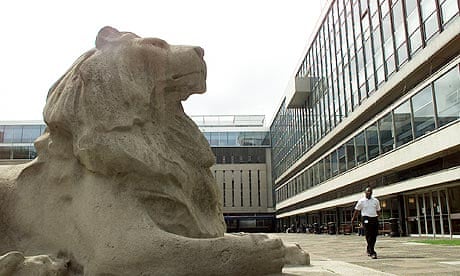Hundreds more teenagers will have to achieve the elite A* grade at A-level this year to stand a chance of winning a place at a top university, the Guardian has learned.
Several of the most prestigious universities have raised requirements for their degree courses this year, meaning a string of straight-A grades is no longer enough to secure a place.
For the first time, students applying to some courses at Bristol, Exeter and Sussex universities could be asked to achieve an A*. University College London (UCL), Imperial College London and the University of Warwick have increased the number of courses requiring the top grade.
Earlier this month, Oxford said it would demand an A* for 15 of its courses. Students would need two A*s to study combined courses in maths and philosophy.
Last year, the only universities to make an A* a requirement were Imperial, Cambridge, UCL and Warwick. Except for Cambridge, these universities asked for the top grade only for a few courses. Cambridge's standard offer was an A* and two As.
The A* was introduced last year to help universities pick out exceptional students, as more than a quarter of A-level entries achieve A grades. To obtain an A*, students must achieve at least 90% in each of their papers in the second year of their A-level exams. Just one in 12 A-level exams were awarded the A* last summer.
The new grade has attracted considerable controversy, with critics claiming it gives private school pupils an added advantage. Last summer, 17.9% of pupils in private schools achieved an A*, while 5.8% from comprehensives did so.
Last year, universities expressed reservations, saying it was hard for teachers to predict whether their pupils would achieve an A*. Universities rely on teachers' predictions to give conditional offers of places.
The new grade has also attracted considerable controversy, with critics claiming it gives private school pupils an added advantage of winning a place at a top university. Private schools that select on academic ability are able to "hot-house" teenagers so they are more likely to achieve the grade, while comprehensive schools must help students from a wide range of abilities, they argue. Last summer, 17.9% of pupils in private schools achieved an A*, while 5.8% did so from comprehensives did so.
This autumn, to read maths and economics at Bristol, students will need an A*. The University of Exeter has decided to make offers of up to an A* and two As for its economics and combined economics degrees, while Sussex will insist on an A* in maths or physics for its physics with a research placement degree.
Imperial College has made winning a place to study maths even harder by demanding students have an A* in further maths as well as one in maths. Aeronautics degrees at Imperial will also need an A* this year.
Those hoping to read politics, philosophy and economics; maths; maths and physics; and statistics and economics at Warwick University will now need an A*. Last year, the university asked this only of students applying for maths.
UCL is insisting on the top grade for psychology, in addition to the four courses that required an A* last year.
Ian Blenkharn, Exeter's head of admissions, said its decision to ask for A*s "reflects the exceptionally high quality of applicants" and "considerable competition for places". Forty-seven percent of its applicants to economics had been predicted at least one A* last year, he said.
Warwick said there were between eight and nine applicants per place and the A* helped admissions tutors to be "even more academically selective where we need to be". Bristol University said that it would use the A* grade "as part of a holistic selection process, in order to help distinguish between otherwise equally qualified applicants".
But Geoff Barton, headteacher of King Edward VI comprehensive in Bury St Edmunds, Suffolk, said that it was too early to demand the top grade.
"It would have been better if universities had waited three years or so before asking for the A*," he said. "We don't yet know how it works. We are running away with ourselves."
Nic Dakin, Labour MP for Scunthorpe and a former sixth-form college principal, said the new grade was "relatively untested".
"Universities will have to be very careful about whether the way it is used. There is already a bias in the system against pupils from comprehensive schools. My fear is that this will further exacerbate this.
The challenge for universities is to tap into talented students who haven't been 'hot-housed'."Earlier this month, statistics showed a record 335,795 people were chasing university places this year, before fees rise in 2012.
Figures from the universities and colleges admission service, Ucas, show applications received before Christmas rose by 2.5% compared with the same period the year before.The University of Birmingham told the Guardian its applications to maths, physics, chemistry and biological sciences were up on last year, while Bristol University said it had seen a rise in applications for medicine and dentistry. The University of Sheffield said it was not seeing a large increase for science subjects, but applications for arts, humanities and social science courses remained strong.

Comments (…)
Sign in or create your Guardian account to join the discussion